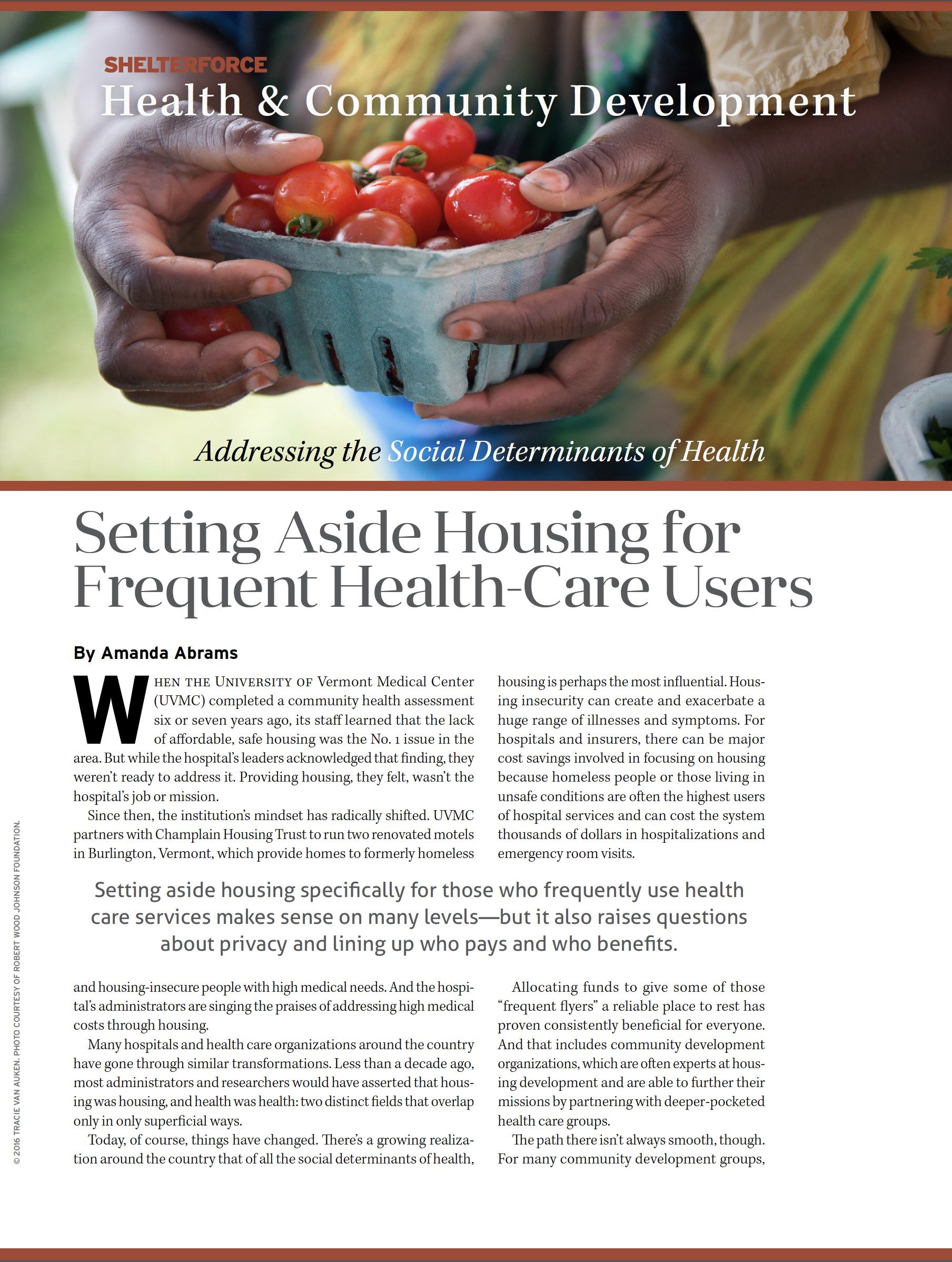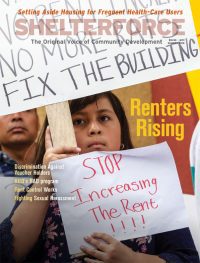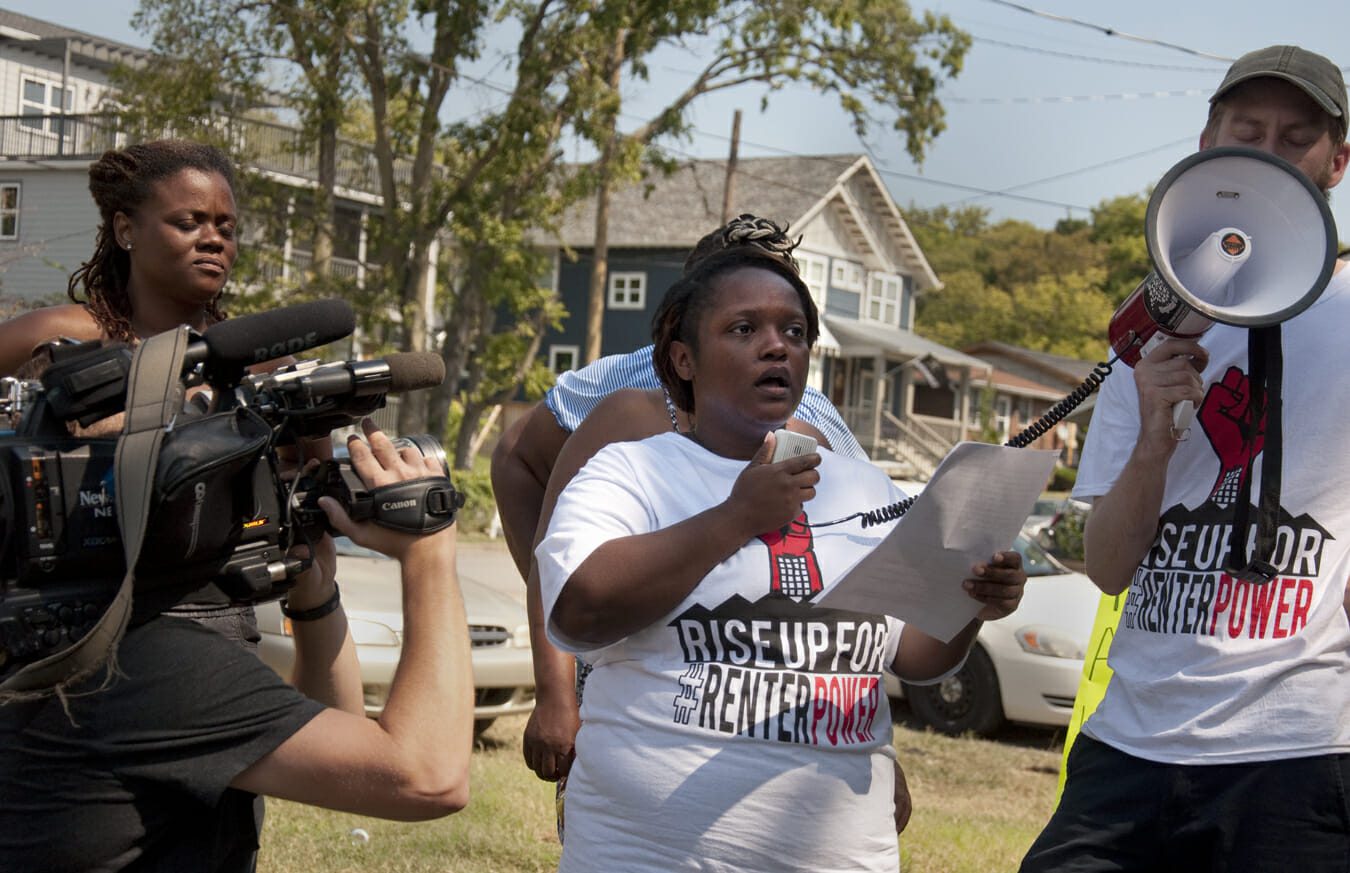
“I was trying to fix my life. And this put a halt on it,” says Khristen Sellers. Photo by Jessica Lussenhop for the BBC
Khristen Sellers needed a home.
The previous few years had been a struggle. She’d left an abusive relationship, been arrested, and wandered out and then back into her children’s lives. Just as she seemed to be getting back on track, a probation violation sent Sellers to prison for the first time.
After five months, she returned to her hometown of Laurinburg, North Carolina. She was broke and homeless, starting over at the age of 29. So when Four-County Community Services—a local nonprofit housing agency—offered her an opportunity to move into a three-bedroom trailer home on the outskirts of town, she readily accepted.
She had applied for the federally subsidized Housing Choice Voucher Program, better known by its former title, Section 8. In the U.S., 2.1 million low-income households rent from private landlords using these vouchers, and their rent is partially or fully covered by funds from the federal government.
Laurinburg is located in one of the most economically depressed counties in North Carolina. Vouchers are coveted, and some people languish on the waiting list for as long as 10 years. Four-County was the local agency entrusted with disbursing them.
Based on need, Sellers qualified relatively quickly. Another Section 8 tenant had abandoned the doublewide trailer on Dorset Drive, and Sellers was told that if she cleaned it, she could move right in.
Every morning, Sellers’ mother dropped her off at the property. For a week, she hauled out broken furniture, pulled rotten food from the refrigerator, scrubbed dog excrement off the carpets, and poisoned the cockroaches. There was extensive damage to the property that Sellers couldn’t fix herself, but before the landlord would make the repairs, an inspector from Four-County had to take a look.
Sellers remembers the first time the agency’s inspector, a former North Carolina state police officer named Eric Pender, came to the property with a clipboard in hand. As she continued to clean, she says the conversation quickly turned from the house to Sellers’ personal life.
“‘Where’s your boyfriend?’ ‘Why you don’t have a man here cleaning?’” Sellers says he asked her. “And I’m like, ‘I don’t have time for a man, I just came out of prison, I’m trying to get my life right.’”
Undeterred, Sellers says Pender asked her if she “gives head” or if she’d ever been paid for sex, implying that his signature on the inspection was the only thing standing between her and a place to live. At one point, she says he called her into the bathroom under the pretense of showing her a needed repair. She says he pulled her in by her hips, blocked the doorway, and took out his penis. She managed to push him out of the way. Sellers was horrified.
It was the first in a string of incidents. “He would never sign. Each time he came, it was like, ‘You owe me before I sign this paper. And you got to make a decision.’”
She worried she would lose her voucher if she complained to the housing agency. A lawyer told her to come back when she had witnesses. A private investigator told her she couldn’t afford him.
A colleague she confided in thought she was doing Sellers a favor by going to Pender’s boss. But the boss told Pender, who confronted Sellers. She managed to secretly record the conversation on her mobile phone. On the recording, Pender said “Be careful who you talk to. You’re on this program because you need it and you done waited a long time. But it’s so easy to lose it.”
Sellers says there were moments when she considered giving in. After all, he was a respected local official, a former cop. She was a homeless single mother with a criminal record.
“If I go tell somebody he said that he’ll say, ‘No, I didn’t.’ Who’s going to look like the liar?” she asks.
Sellers felt utterly alone. What she didn’t know at the time was she was just one of dozens of women who had gone through something similar.
Vulnerability and Poverty
In a post-Harvey Weinstein and #MeToo world, most people are well aware sexual harassment occurs in the workplace. But across the U.S., women are subjected to it in a far more intimate setting—their homes.
Every year, hundreds of state and federal civil lawsuits are filed against landlords, property owners, building superintendents, and maintenance workers alleging persistent, pervasive sexual harassment and misconduct, covering everything from sexual remarks to rape. This includes so-called “quid pro quo” sexual harassment, wherein the perpetrator demands sex in exchange for rent or repairs.
In employment, “It’s horrible, but you can leave and go home,” says Kelly Clarke, a supervising lawyer at the Fair Housing Project of Legal Aid of North Carolina. “This is somebody who can invade your home.”
There has never been a comprehensive national survey of tenants to track the frequency of sexual harassment in housing, or to determine where or to whom it occurs most often. And housing authorities and agencies that disburse federal housing benefits are not obligated to record or report the number of harassment complaints they receive each year.
Most advocates and experts believe poor women and women of color are disproportionately affected, though that is based mainly on experiential evidence and a single, 30-year-old study. Advocates say victims who are undocumented or who do not speak English are also easy targets, as are women fleeing domestic violence.
The demographic make-up of subsidized housing in the U.S. may create a uniquely vulnerable population. National figures show that 74 percent of Section 8 and public housing units are occupied by female-headed households, and one-third of those have children. Public housing policy often bars or severely limits overnight guests, a rule designed to prevent overcrowding that also translates into women who are on their own the majority of the time.
The lack of affordable housing stock in major American cities compounds the desperate circumstances renters can find themselves in. A single eviction can preclude victims from huge swaths of the public and private housing market.
“The link is vulnerability and poverty,” says Kate Sablosky Elengold, a clinical associate law professor at University of North Carolina who prosecuted sexual harassment cases for the justice department’s civil rights division. “The risk to a woman standing up against it is homelessness.”
Sexual Harassment in Housing
Another woman, Judy, tried to put what happened in Laurinburg behind her. After all, she’d already lost the tiny red house on the east side of town, and was forced to move to Baltimore, Maryland, crammed into an apartment with her adult children. Besides that, she was ashamed. (Judy requested the BBC not publish her full name).

Four-County Community Services’s former offices in Laurinburg, North Carolina. Photo by Jessica Lussenhop for the BBC
But then she learned that Eric Pender and his boss John Wesley at Four-County Community Services were in big trouble. Three women were accusing the men of years of sexual misconduct at the housing agency. Pender was also criminally charged with simple assault.
Judy Googled Craig Hensel, the young lawyer who had finally heard Khristen Sellers’ story and filed a lawsuit. “I gave [Hensel] a call,” Judy says. “I told him something similar happened to me.”
Around 2008, Judy moved to Laurinburg and received a housing voucher from Four-County. Four years later, she says she made a crucial mistake—she signed on a lease for a public housing unit in Baltimore for her daughter. Receiving federal housing benefits in two places constitutes fraud, and a caseworker at Four-County Community Services informed Judy the voucher for the little red house would be terminated.
Judy left that meeting distraught, and says that’s when she bumped into Pender, who offered his help.
Pender always had something to say about her looks, her shape, the smell of the oil she wore, Judy says. Twice, she claims, he groped her buttocks. This time, she alleges, he told her he could help with her voucher situation if, “You help me out.” Judy says it was clear to her that he was talking about sex.
“I felt like my back was up against the wall,” she recalls. “I needed to keep a roof over me and my son’s heads. I didn’t have the money.”
According to Judy, Pender came to her home after hours for a single sexual encounter. She assumed Pender would be able to do something to save the voucher. Instead, she says, he did nothing and the voucher was terminated.
“This man used me,” she says. “I felt humiliated.”
A Formal Complaint
Victims can report sexual harassment to state and municipal civil rights entities, private fair housing agencies—like local legal aid offices—and to federal agencies like the Department of Justice (DOJ) and the U.S. Department of Housing and Urban Development (HUD).
But the process varies from state to state and agencies often have different requirements in terms of time an investigation can take and level of confidentiality. Civil legal proceedings can take years, and evictions only a matter of weeks. Besides, many victims are simply unaware they can make a formal complaint.

This woman says Four-County employees assaulted her. She did not want her face shown. Photo by Jessica Lussenhop for the BBC
In October 2017, the justice department announced a new Sexual Harassment in Housing Initiative, which aims to lower barriers to reporting. It opened a dedicated hotline for sexual harassment in housing complaints. New interventions and trainings are being proposed for local police departments and landlord-tenant courts. A nationwide rollout of these solutions could come later this year.
But successfully making a complaint is just the first step. For Khristen Sellers and the other women, it was just the beginning of the ordeal.
“The breadth of it was so shocking,” says Jessica Clarke, a former DOJ lawyer who eventually handled the Laurinburg case. “When the person who has the keys to your door, who controls where you live is a predator, there’s nothing scarier.”
Although Sellers and her lawyer now had other women like Judy willing to go public with their stories, it became clear it was going to be a difficult road forward. Not only did Pender continue in his job as usual, but one of the complainants was called to Four-County’s offices and suddenly recanted. Less than a month later, the woman received a housing voucher.
Four-County also attempted to terminate Sellers’ voucher, purportedly over the shoddy condition of her trailer. Pender himself signed the termination letters sent to Sellers.
But by then, the floodgates were open. Women were coming forward with allegations spanning years, and many pointed to Pender’s boss, John Wesley.
A Lengthy Case
“Finding one victim often leads to finding 2, 6, 16, 23—in many of these cases we uncover ongoing harassment of many women over a period of years,” says Sara Pratt, the former deputy assistant secretary for enforcement and programs at HUD. “That is unfortunately all too common.”
Civil and human rights agencies cannot easily report how many of their housing cases involve allegations of sexual harassment each year. Of the state agencies that did provide that information, the number of cases per year were in single or low two-digit numbers. California was the exception, recording dozens of complaints each year, including 159 complaints in 2015.
In total, 16 women came forward in Laurinburg, and of those, 6 said they had engaged in sex or other sexual activity with one or both men.
Wesley says he “categorically denies” all the allegations made against him. He says the women were motivated by money.
Pender did not respond to requests for comment. He denied all the allegations throughout the legal proceedings.
In February 2014, two years into the lawsuit, a state audit revealed the agency was riddled with nepotism, and misspent $4.8 million worth of taxpayer money. One executive director was fired, and the organization changed its name to Southeastern Community and Family Services.
One thing did not change—Pender and Wesley still had jobs.
A lengthy case of this nature is typical. Gustavo Velasquez, former assistant secretary of fair housing and equal opportunity at HUD under the Obama administration, says when he first joined the department in 2014, sexual harassment investigations were dragging on for years.
“We were able to bring that number down to nine months. But it really should be 90 days,” he says.
HUD became aware of the Laurinburg case about a year and a half after Sellers first came forward. They sent their investigators to Laurinburg, who sent their findings to the justice department. Then the DOJ began its own investigation.
By the time the inquiry concluded, 71 additional women came forward with complaints deemed credible by the justice department. In December 2014, the DOJ filed a federal lawsuit against Four-County.
Pender was placed on administrative leave; Wesley was required to be accompanied by a female employee on any home visits. Security cameras were installed in the offices. But the agency refused to resolve with the DOJ, calling the lawsuit
“frivolous.”
Finally, in the summer of 2015, HUD sent letters threatening to withhold Four-County’s funding if it did not address the sexual harassment complaints. Both Pender and Wesley were finally terminated, and soon afterward, the lawsuit was settled for $2.7 million. At the time, it was the largest settlement of its kind in federal housing law history.
Failing to Act
In recent years, the justice department has brought several cases against housing authorities not only for sexual harassment of tenants by employees, but also for failure to act on complaints. A case against the Housing Authority of Baltimore City brought by private lawyers resulted in a $7.9 million settlement for 113 victims.
BBC reached out to the 16 largest public housing authorities and housing voucher programs in the U.S. to find out what their reporting policy is for tenants and whether they track complaint numbers year to year. Although most respondents said their staff undergo sexual harassment training, procedures for taking tenant complaints varied. Some had no specific policy, some do not keep track of the number of complaints coming in and justified that by saying the number of reports each year are too low.
“Public housing authorities are terrible at doing this,” says Velasquez, the former HUD official. “I think housing authorities in large cities—they don’t have an excuse.”
The BBC filed a Freedom of Information Act request in May of 2016 for HUD complaints of sexual harassment going back to 2010, in the hope of parsing out any trends. A year and a half later, the request has yet to be met.
The Nightmare Is Over
Under the Laurinburg settlement—in which neither the agency nor Pender or Wesley had to admit liability—the men will never be allowed to handle any Section 8 voucher program responsibilities or participate in property management. If they choose to become private landlords, they must hire an independent manager, subject to federal approval.
In some cases, private landlords can be barred from participating in federally funded voucher programs. Anna Maria Farías, assistant secretary for fair housing and equal opportunity at HUD, says her office is working on new policies to ensure once someone is fired from a housing authority for sexual harassment, they cannot join another one.
In truth, the Laurinburg settlement could only fix certain aspects of the women’s lives. But some flourished. Judy enrolled in school and achieved her dream of earning her high school diploma. Sellers moved an hour and a half away from Laurinburg with her children to a quiet, tree-lined street in Greensboro, North Carolina. It seems like a world away from the decrepit trailer in Laurinburg where Eric Pender entered her life.
“I’m glad it’s over,” she says. “I hope he realizes what he’s done at this point. I don’t know if he has.”
The article was excerpted from a longer article published by the BBC. Read the full piece here: bit.ly/Lussenhop. Excerpted with permission.
Want to know how to prevent this sort of problem at your agency? Learn about what to look for and what to do here.




Comments